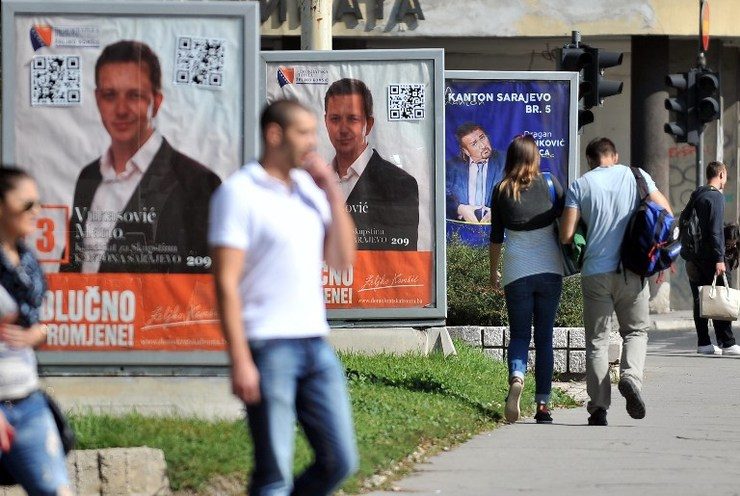SUMMARY
This is AI generated summarization, which may have errors. For context, always refer to the full article.

SARAJEVO, Bosnia and Herzegovina – Bosnians vote in a general election Sunday, October 12, amid mounting social discontent in a country plagued with corruption and ethnic disputes hampering its approach to the European Union.
Nearly 20 years since a devastating war between its Croats, Muslims and Serbs Bosnia is one of Europe’s poorest countries and remains split along ethnic lines.
The 1992-1995 conflict, which claimed some 100,000 lives, left the former Yugoslav Republic divided into two semi-autonomous entities – the ethnic Serb Republika Srpska and the Muslim-Croat Federation – linked by weak central institutions.
Some 3.3 million voters are eligible to cast ballots to elect three members – a Croat, a Muslim and a Serb – of the joint presidency as well as a new central parliament. They will also elect the two entities’ assemblies and in Republika Srpska a president.
As always ahead of elections here, politicians have returned to nationalist rhetoric to attract votes.
Bosnian Serb President Milorad Dodik, a nationalist running for a new turn, has renewed threats of his entity’s secession.
“The aim of my policy is that we are less and less an entity and more a state!” he told a poll rally.
In response, the Muslim member of the presidency, Bakir Izetbegovic, who is also running for a second term, has appealed for “unity” among Muslims.
At a Sarajevo rally Izetbegovic warned that politics of “referendums and divisions will not pass” and also slammed ethnic Croats’ aspirations for a separate entity for themselves.
Major social discontent
Bosnia’s unemployment rate officially stands at 44%. Some 18% of the population live below the poverty line while the average monthly salary is 415 euros ($525).
The country is also plagued by corruption, which costs taxpayers some 750 million euros ($945 million) annually, according to non-governmental organizations.
Growing public discontent escalated in February into the kind of popular uprising not seen since the 1992-1995 war.
Thousands took to the streets protesting against the government’s failure to fight graft and introduce political and economic reforms needed for the country to gain EU membership.
“Those who will come to power are likely to be quickly confronted with major social discontent” if they do not radically change things, political analyst Enver Kazaz told Agence France-Presse.
Historic floods in May, whose damage is estimated at 2 billion euros or 15% of Bosnia’s gross domestic product, have further aggravated a grim economic situations.
Apart from its severe economic crisis, Bosnia has also seen a political deadlock since 2006 due to the ethnic tensions.
Politicians from the three major ethnic groups – Croats, Muslims and Serbs – have failed to agree on major Brussels-sought reforms, leaving Bosnia lagging behind its fellow Balkan countries on the path to the 28-nation bloc.
An EU statement on Friday, October 10, said Bosnians should expect their elected officials “to bring much needed reconciliation in society and politics … close the gap with rest of the region and ensure progress towards the EU.”
Some 5,400 polling stations open at 0500 GMT and will close twelve hours later. First partial results are expected around 2200 GMT. – Rappler.com
Add a comment
How does this make you feel?
There are no comments yet. Add your comment to start the conversation.